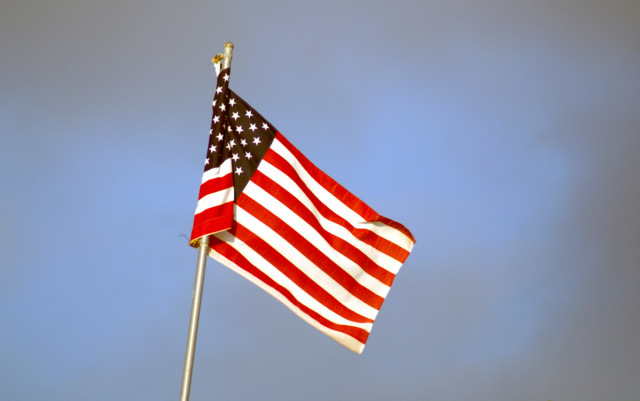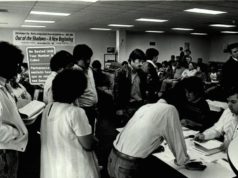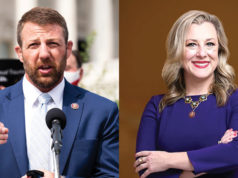The United States faces a crisis of proportions not seen in many years — the difference is it has largely gone unnoticed amidst the noise generated by our current administration’s daily crises.
The crisis I mean is a systemic one, partially caused by President Donald Trump but also by a larger failure of American leadership. How and if we can solve it will determine whether this century can truly be a second “American Century” as the 20th century was.
In Europe, a war in Ukraine that continues to simmer and can be ordered into a full boil with a single Kremlin phone call. Brexit has fractured a pillar of the European security system, reliant as it is on British nuclear submarines. Europeans now feel less secure and must take their future into their own hands, as German Chancellor Angela Merkel recently said. That’s good and right for Europe, hopefully, but they must first overcome the individual national interests and identities of 27 different countries, some of them NATO members and some of them neutral. Good luck with that. Seriously.
In Asia, I don’t worry about the antics of Kim Jong-un because he is entirely self-interested. He must concern himself first and foremost with the survival of his regime and the ruling power of his family, neither of which would survive a war with South Korea and the United States. The more worrying conflict is over the islands of the South China Sea because it represents the erosion of those norms which prevent conflict and preserve stability within the international system.
U.S. the only modern dominant power
Stability — peace — is preserved by an informal system created in the aftermath of World War II. In its intent, it is similar to the system created at the end of the Napoleonic Wars at the Congress of Vienna. Both systems sought the end of war between major powers. Both managed change but did not prevent it. For examples, take the relatively minor Austro-German and Franco-German wars that saw Prussian dominated Germany become a leading European power, and the replacement of British world power with American power in the 1940s and 1950s.
Following the collapse of the Soviet Union in 1991, the modern international system has only dominant power — the United States. After 1945, the U.S. built a system of alliances and institutions that was largely responsible for the preservation of peace. We need only look at international trade and the WTO — an American commitment to democracy and guarantee for Western European security that has kept Europe free from conflict for the longest period in recorded history and saw democracy spread to those countries which previously labored under authoritarian dictatorships.
That’s a pretty good record, all things considered. Our record since 1991, however, is decidedly less positive: We squandered our chance to continue building up our leadership. Instead, we severely damaged our most important alliances with the 2003 Iraq War. President Bush’s infamous shoulder rub of Merkel notwithstanding, the only progress in restoring the strength of the Transatlantic Partnership was made under President Obama.
‘Triumph of ignorance’
President Obama, tied down at home by constant domestic battles and an uncompromising Congress, was unable to make the kind of progress that would have restored the promise of American leadership. The Trans-Pacific Partnership and the Transatlantic Trade and Investment Partnership — as I argued on NonDoc in January — would have helped to secure the future of American leadership. Instead, they were cast aside by Trump in a misguided sacrifice to making America “great again.”
Trump’s election placed the least qualified candidate into the world’s most powerful office. His election and his whole presidency thus far represent the triumph of ignorance over the ideal of enlightened self-governance upon which our nation was founded. We have a real estate developer who sees the world only from his peculiar position ensconced in (ugly) Trump Tower and focuses on a series of his own real estate deals. The damage he could do to America’s role in the international order is immense.
The president, while just a candidate, was asked whether Saudi Arabia and Japan should have nuclear weapons. “Absolutely” was his uninformed answer. But the danger of a Saudi nuclear weapon is that Iran would feel they must also have one, withdrawing from the Nuclear Agreement and going full speed back into development. They still have the scientists and expertise, after all. A Japanese nuclear weapon would plunge the whole region into evermore dangerous instability, China on hair-trigger alert. A Japanese bomb is even more pointless, as they are already included in the group of countries under our nuclear umbrella. An attack on Japan would yield the highest possible response, and China knows this.
The president is not the cause of the quiet crisis, he has only brought it to the fore. What can we do to preserve our position as the leading world power, the rightful and more importantly, democratic, guarantor of stability? One thing is to recommit ourselves to the idea of “achieving our country.” That is, to the idea of our common citizenship, working together for a common dream of equality and shared prosperity. That means tackling income inequality, ensuring technical training and community college are accessible for everyone. (Not everyone is a good fit for a four-year college degree, and that should be considered perfectly fine.)
What ‘freedom’ and ‘democracy’ really mean
Let us commit to a revival of civic education. Leading discussion this spring with 54 freshmen in an “Introduction to American Government” class, we talked about five things every American citizen should know about this country. Most students suggested the three branches of government, or who the Speaker of the House is, or how state government works — all of these things are important, sure. More important, however, is to understand the role the United States has played in history. How can we ensure that all Americans understand the fundamental values upon which our nation was founded or how we became the world’s leading power? We must go beyond a cartoonish understanding of “freedom!” and “democracy” and think about a genuine understanding of what those words mean. We must go beyond “kickin’ Nazi ass in WW2” and look at how the world reached that point. We must go beyond the hollow rhetoric of “make America great again!” and achieve the promise of our country for every American.
On Memorial Day, I couldn’t help but think of how my dad and I used to go to the Veterans Cemetery in northeast Oklahoma City to read Lincoln’s Gettysburg Address. Those who died on that battlefield died for the same principles upon which our post-1945 order was based: the struggle to ensure that government of the people, by the people, and for the people will not perish from this Earth. Government that ensures all citizens are treated with respect and decency enables them to achieve what they wish to achieve in their lives.
If the United States wishes to continue to lead, we can only do so by remembering those values. We can only do so not by turning inward, but by working with our allies around the world. We can end the quiet crisis and lead for a second American Century. To paraphrase Henry Luce, we must weave together our own individual purposes into the triumphal flag of freedom and common purpose. In doing so, we can achieve our country, and truly honor the sacrifice of those whose passing we commemorate every year on Memorial Day.






















